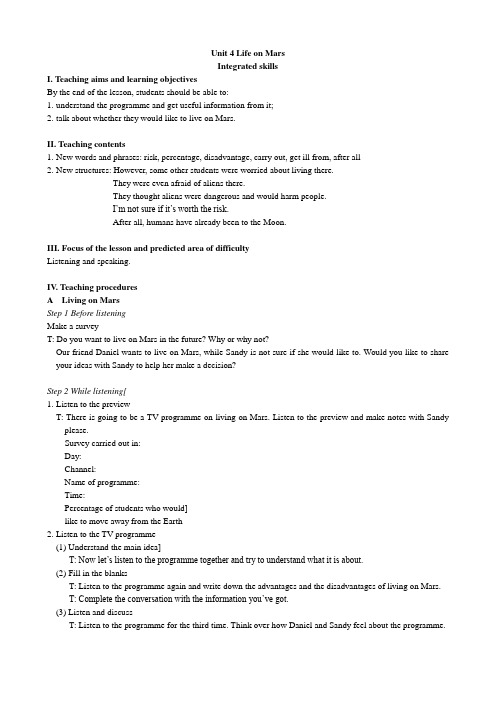译林版 初中九年级下册 Unit 4 Integrated skills ppt课件
- 格式:pptx
- 大小:5.45 MB
- 文档页数:26

Unit 4 Life on MarsIntegrated skillsI. Teaching aims and learning objectivesBy the end of the lesson, students should be able to:1.understand the programme and get useful information from it;2.talk about whether they would like to live on Mars.II. Teaching contents1.New words and phrases: risk, percentage, disadvantage, carry out, get ill from, after all2.New structures: However, some other students were worried about living there.They were even afraid of aliens there.They thought aliens were dangerous and would harm people.I’m not sure if it’s worth the risk.After all, humans have already been to the Moon.III. Focus of the lesson and predicted area of difficultyListening and speaking.IV. Teaching proceduresA Living on MarsStep 1 Before listeningMake a surveyT: Do you want to live on Mars in the future? Why or why not?Our friend Daniel wants to live on Mars, while Sandy is not sure if she would like to. Would you like to share your ideas with Sandy to help her make a decision?Step 2 While listening[1.Listen to the previewT: There is going to be a TV programme on living on Mars. Listen to the preview and make notes with Sandy please.Survey carried out in: _____________________Day: _____________________Channel: _____________________Name of programme: _____________________Time: _____________________Percentage of students who would]like to move away from the Earth ________2. Listen to the TV programme(1) Understand the main idea]T: Now let’s listen to the programme together and try to understand what it is about.(2) Fill in the blanksT: Listen to the programme again and write down the advantages and the disadvantages of living on Mars.T: Complete the conversation with the information you’ve got.(3) Listen and discussT: Listen to the programme for the third time. Think over how Daniel and Sandy feel about the programme.B Speak up: Earth or Mars?Step 1 After listeningShare your ideasT: After watching the TV programme, how do you feel about living on Mars? Would you like to go there? S: I’d love to live on Mars, because …I’m not sure if it’s worth the risk …Step 2 Practice1.Listen and answerT: Listen to the dialogue between Daniel and Sandy, and answer the following questions.(1) Who would like to live on Mars, Simon or Daniel?(2) Would Sandy like to live on Mars? Why or why not?2.Make a similar dialogueV. Homework1. Recite Part B.2. Talk more about living on Mars after class.。

Unit 4 Integrated skills & Study skills【学习目标】1.能记住并能正确运用本节课词汇carry out, percentage, disadvantage, risk, after all。
2.能从听力材料中获取信息,会用英语谈论火星生活,并总结其优劣处。
3.学会自我评价,制定学习计划。
【预习导学】一、词汇记忆1.风险2.百分数3.劣势,不利条件4.开展5.毕竟6.频道7.语法规则8.提高,改善二、想一想。
将你常用的英语学习方法写下来,与同伴交流,完成下表。
Ways of studying EnglishYou Your partner【答案】一、词汇记忆1.risk2.percentage3.disadvantage4.carry out5.after all6.channel7.grammar rules8.improve二、想一想。
将你常用的英语学习方法写下来,与同伴交流,完成下表。
Listen to tapes Work in pairs Sing English songs Join an English club Learn grammar【合作探究】任务驱动一听力训练1.听教材Integrated skills中A1部分录音,填空。
The host of Sunshine TV did a in schools in Sunshine Town by asking three questions. The questions are:Is there on Mars? Should we there? What would be like there? The survey showed that 50% of the students would like to move to .2.听教材Integrated skills中A2部分录音,连线将人物和观点匹配。



牛津译林版英语九年级下册《Unit 4 Life on Mars Integrated skills》说课稿2一. 教材分析《牛津译林版英语九年级下册》Unit 4的主题是“Life on Mars Integrated skills”,本课的主要内容是讨论火星上的生活以及人类对火星探索的期待。
教材通过丰富的图片、图表、阅读材料等形式,引导学生了解火星的基本情况,以及科学家们对火星生命存在的猜测和研究。
本课旨在提高学生对科普文章的理解能力,培养学生运用英语进行信息获取和交流的能力。
二. 学情分析九年级的学生已经掌握了基本的英语语法和词汇,具有较好的英语阅读和写作能力。
他们对未知事物充满好奇,对科技话题感兴趣,但同时也存在一定的阅读难度和科学背景知识缺乏的问题。
因此,在教学过程中,需要关注学生的个体差异,调动他们的学习积极性,帮助他们理解和掌握课文内容。
三. 说教学目标1.知识目标:学生能理解火星的基本情况,掌握与火星探索相关的词汇和表达方式。
2.能力目标:学生能运用英语进行阅读、听力、口语和写作,提高信息获取和交流的能力。
3.情感目标:学生通过对火星探索的学习,培养对科学的热爱和好奇心,增强环保意识。
四. 说教学重难点1.重点:学生能理解课文内容,掌握相关的词汇和表达方式。
2.难点:学生能运用英语进行信息获取和交流,理解科学家们对火星生命存在的猜测和研究。
五. 说教学方法与手段1.教学方法:采用任务型教学法,让学生在完成任务的过程中,提高英语应用能力。
2.教学手段:利用多媒体课件、网络资源、小组讨论等手段,激发学生的学习兴趣,提高课堂参与度。
六. 说教学过程1.导入:通过展示火星的图片和视频,引导学生关注火星,激发学习兴趣。
2.读前活动:学生预览课文标题和图片,猜测课文内容,激发阅读欲望。
3.读中活动:学生阅读课文,回答问题,讨论课文内容,巩固知识点。
4.读后活动:学生进行小组讨论,探讨火星探索的意义和自己的看法,进行口头报告。
